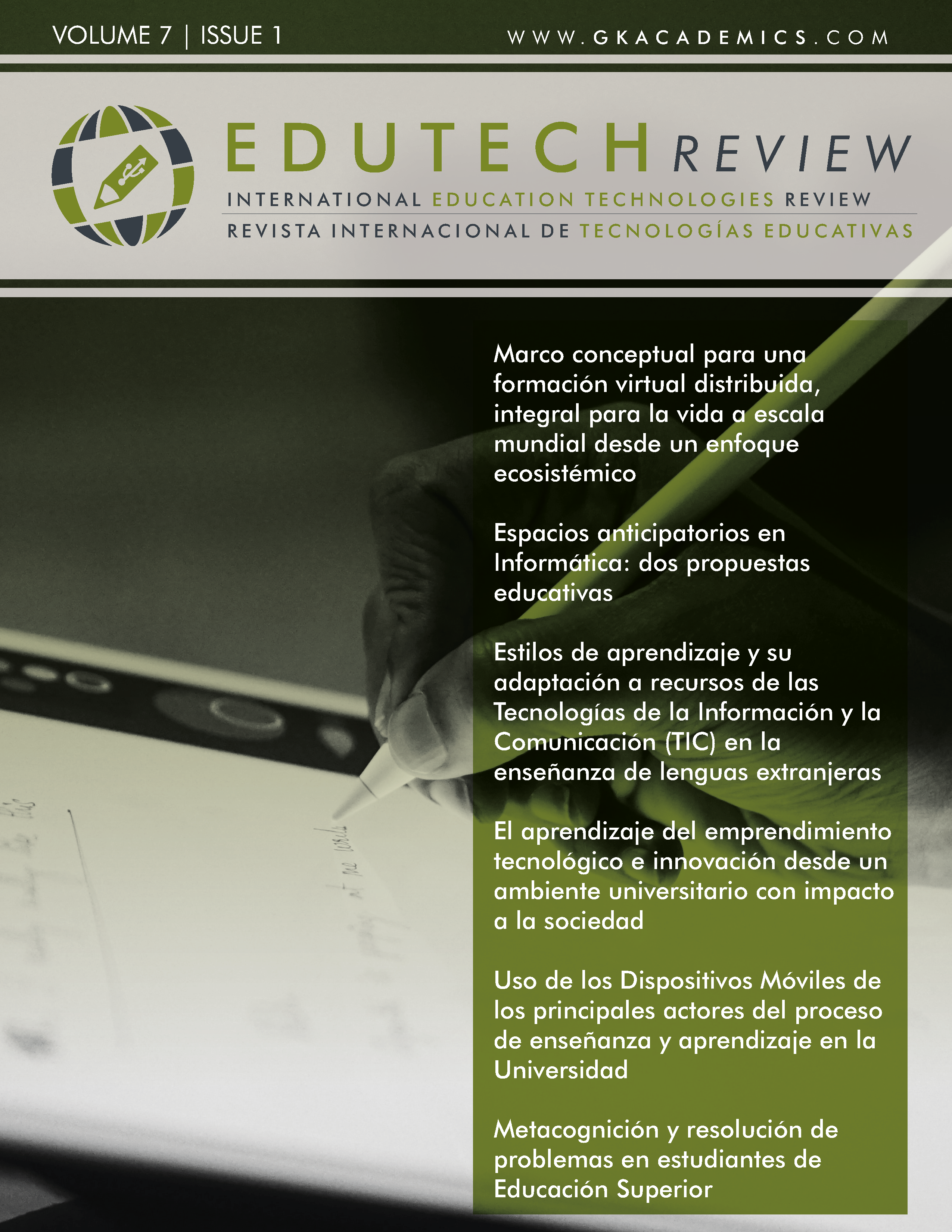Conceptual Framework for Distributed Virtual Training, Integral to Life on a Global Scale from an Ecosystem Approach
DOI:
https://doi.org/10.37467/gka-revedutech.v6.2347Keywords:
Educational ecosystem, Virtuality, Information Societies, Integral education, Education for lifeAbstract
Thanks to information and communications technologies (ICT), education systems have had an unprecedented momentum, have been extended worldwide and can be accessible regardless of geographic location; But this potential could give it a greater boost, a system of distributed training, integrating formal, non-formal and informal education, with the world of work and culture. In this work, a theoretical-conceptual critical approach was carried out to support, from an ecosystem approach, the redesign of distributed and collaborative educational ecosystems for a distributed, comprehensive virtual education and for life on a world scale.
Global Statistics ℹ️
|
489
Views
|
773
Downloads
|
|
1262
Total
|
|
References
Bertalanffy, von Ludwig (1976). Teoría general de los sistemas. Fundamentos, desarrollo, aplicaciones. México: Fondo de Cultura Económica.
Bateson, Gregory (1972). Steps to an Ecology of Mind: Collected Essays in Anthropology, Psychiatry, Evolution, and Epistemology. University Of Chicago Press.
Cárdenas, E. P. L., García, P. A. M., Piraguata, J. A. R., & Padilla, A. S. (2017). Estado del arte sobre la articulación de modelos enfoques y sistemas en educación virtual. Escuela de Ciencias de la Educación ECEDU. Recuperado de http://hemeroteca.unad.edu.co/index.php/book/article/view/1969/2189
Cobo, Cristobal y Movarek Jhon. (2011). Aprendizaje Invisible, Hacia una nueva ecología de la educación. Libro electrónico Recuperado de http://www.razonypalabra.org.mx/varia/AprendizajeInvisible.pdf
Consorcio Universidad 2030 Virtual Educa (2019). Recuperado de https://virtualeduca.org/universidad2030/consorcio-universidad-2030
Day, John y Zimmermann, H. (1983). The OSI reference model. Proceedings of the IEEE, 71(12), 1334-1340. DOI: https://doi.org/10.1109/PROC.1983.12775
Denning P.J. et al. (1989). Computing as a Discipline. Communications of the ACM. Association for Computing Machinery, 32(4), 9–23. DOI: https://doi.org/10.1109/2.19833
De Sousa, B. (2009). Introducción Epistemología del Sur. Libro en versión electrónica: http://www.boaventuradesousasantos.pt/media/INTRODUCCION_BSS.pdf
ECOESAD (2008). Espacio Común en Educación a Distancia. Sitio Recuperado de http://www.ecoesad.org.mx/
École 42. (2013). École 42. Recuperado de https://www.42.fr/
Escudero, A. (2018). Redefinición del “aprendizaje en red” en la cuarta revolución industrial. Apertura 10(1), 149-63. Recuperado de: http://www.scielo.org.mx/scielo.php?script=sci_arttext&pid=S1665-61802018000100149 DOI: https://doi.org/10.32870/Ap.v10n1.1140
FIPA Foundation for Intelligent Physical Agents, (2005). IEEE Computer Society standards organization, Recuperado de http://www.fipa.org/
Freire, J. (2011). Ecosistemas de aprendizaje y tecnologías sociales, nómada, blog de juan freire. Recuperado de https://nomada.blogs.com/jfreire/2011/05/ecosistemas-de-aprendizaje-y-tecnolog%C3%ADas-sociales-tedxuimp.html
González Casanova, P. (2017). Las nuevas ciencias y las humanidades: de la academia a la política. 1ª. Ed. Ciudad Autónoma de Buenos Aires. CLACSO.
González-Sanmamed, M.; Sangrà, A.; Souto-Seijo, A. y Estévez, I. (2018). Ecologías de aprendizaje en la Era digital: desafíos para la educación superior. Publicaciones, 48(1). Facultad de Educación y Humanidades del Campus de Melilla, España. 25-45. Recuperado de: https://pdfs.semanticscholar.org/2ce0/26d7ee9dda43df39caec75a483dfecddfde5.pdf?_ga=2.8592055.36999549.1581194882-665151805.1581194882 DOI: https://doi.org/10.30827/publicaciones.v48i1.7329
Guattari, P. F., Vázquez Pérez, J. y Larraceleta, U. (2000). Las tres ecologías. Valencia: Pre-Textos. Recuperado de https://www.arteuna.com/talleres/lab/ediciones/FelixGuattariLastresecologas.pdf
Hutchins, R. (1968). The learning society. University of Chicago Press.
Levy, P. (1997). Cyberculture. Rapport au Conseil de l'Europe dans le cadre du projet Nouvelles technologie: coopération culturelle et communication. Vol. 1. Paris: Ed. Odile Jacob.
Levy, P. (1998). Tecnologías de inteligencia: el futuro del pensamiento en la era de la informática. Editorial 34
Levy, P. (1999). ¿Qué es lo virtual?. Barcelona: Paidós. Recuperado de http://www.hechohistorico.com.ar/Archivos/Taller/Levy%20Pierre%20-%20Que%20Es%20Lo%20Virtual.PDF
Levy, P. (2004). Inteligencia colectiva. Por una antropología del ciberespacio. Biblioterca Virtual en Saude. Recuperado de http://inteligenciacolectiva.bvsalud.org/public/documents/pdf/es/inteligenciaColectiva.pdf
Luksha P., Cubista J., Laszlo A., Popovich M. y Ninenko I (Eds.). (2017). Global Education Futures Report: educational ecosystems for societal transformation. Recuperado de http://www.globaledufutures.org/images/people/GEF_april26-min.pdf
McLuhan, E. y McLuhan, M. (2011). Theories of communication. Nueva York: Peter Lang.
O'Neil, K. (2017). Armas de destrucción matematica. Como el big data aumenta la desigualdad y amenaza la democracia. Madrid: Capitan Swing libros.
OSI-ISO (1994), Modelo para la interconexión de sistemas abiertos. Recuperado dehttp://standards.iso.org/ittf/PubliclyAvailableStandards/s020269_ISO_IEC_7498-1_1994(E).zip.
Rendueles, C. (2016). La ciudadanía digital. ¿Ágora aumentada o individualismo postmaterialista. Revista Latinoamericana de Tecnología Educativa RELATEC 15(2). España, 15-24.
Sánchez, V. (2017). Cap. 16: Principios de un modelo de ecosistema de aprendizaje basado en las experiencias de un seminario. Aprendizaje creador y nuevas prácticas pedagógicas, Congreso Internacional de Transformación Educativa. Amapsi Editorial, México, 334-353.
Secretariat of the Convention on Biological Diversity (2004). Enfoque por ecosistemas. Montreal, QC, Canada: Secretaría del Convenio sobre la Diversidad Biológica. Recuperado de https://www.cbd.int/doc/publications/ea-text-en.pdf
Swartz, R. J., Reagan, R., Costa, A. L., Beyer, B. K., y Kallick, B. (2015). El aprendizaje basado en el pensamiento. Cómo desarrollar en los alumnos las competencias del siglo XXI. Ediciones SM España.
Valle, A. (2019). Técnica y Autonomía. Reflexiones téorico-filsóficas. Hernández, G., Ortiz, Henderson, Nájera, Gladys; Espinosa, Ozziel, (Eds). Futuros digitales exploraciones socioculturales de las tic.
Worl Ecomic Forum (2016). The Fourth Industrial Revolution: what it means, how to respond. Recuperado de https://www.weforum.org/agenda/2016/01/the-fourth-industrial-revolution-what-it-means-and-how-to-respond/.
Zimmerman, H. (1980). OSI Reference Model – The ISO Model of Architecture for Open Systems Interconnection. IEEE Transactions on Communications, 28(4), 425-432. DOI: https://doi.org/10.1109/TCOM.1980.1094702
Downloads
Published
How to Cite
Issue
Section
License
Copyright (c) 2022 EDUTECH REVIEW. International Education Technologies Review / Revista Internacional de Tecnologías Educativas

This work is licensed under a Creative Commons Attribution-NonCommercial-NoDerivatives 4.0 International License.
Those authors who publish in this journal accept the following terms:
- Authors will keep the moral right of the work and they will transfer the commercial rights.
- After 1 year from publication, the work shall thereafter be open access online on our website, but will retain copyright.
- In the event that the authors wish to assign an Creative Commons (CC) license, they may request it by writing to publishing@eagora.org







